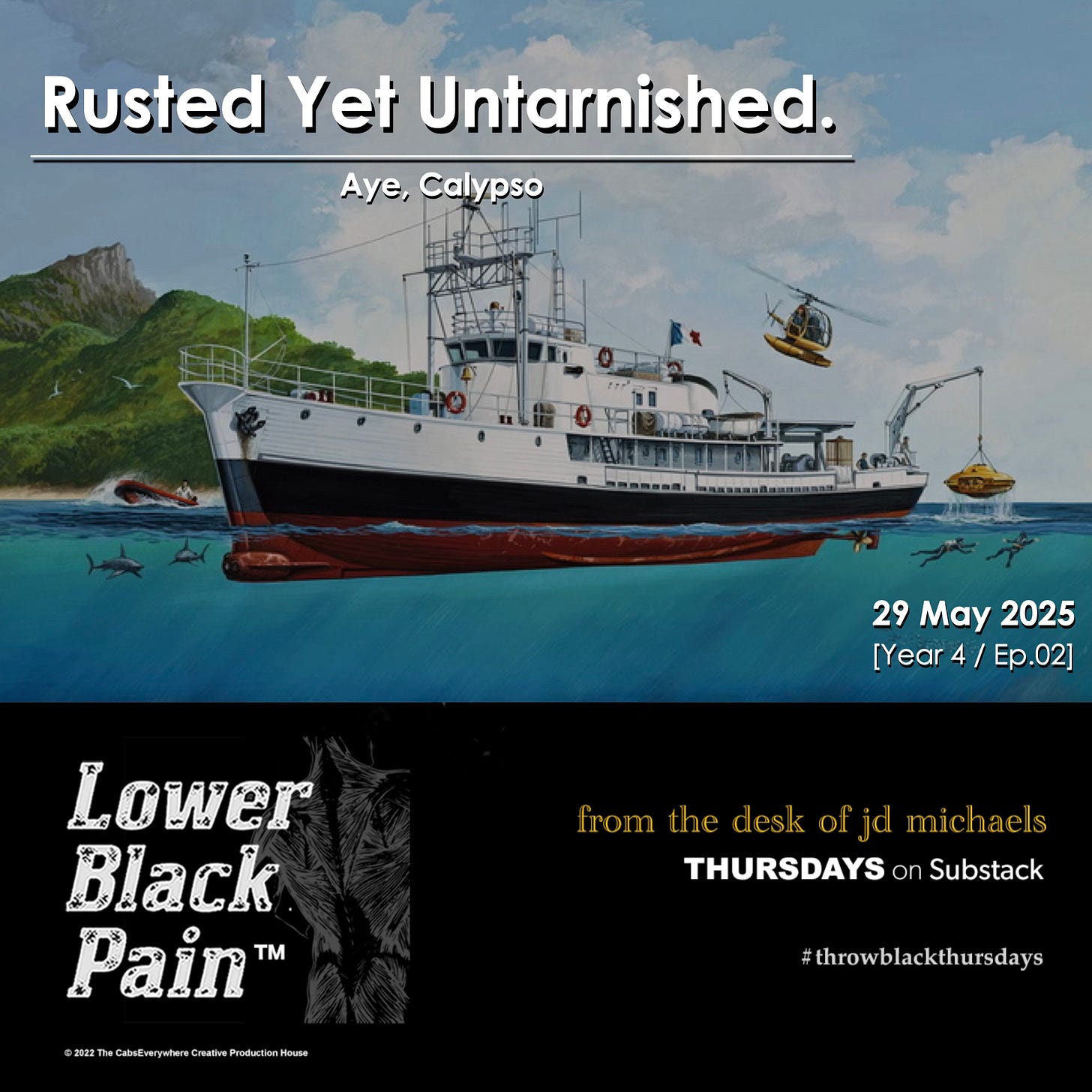I left work yesterday whistling a sea shanty. I do not know many; I understand they are a quite popular genre in some circles. One of my first “favorite songs”was “What Shall We Do With The Drunken Sailor?” which for some reason we sang in Montessori - an odd choice given our landlocked position in Kansas City and lack of experience with alcohol.
I don’t know that I can categorize the song I sang yesterday as a proper shanty, as it was written by John Denver, a very popular folk and country artist of the 1970’s. Most of his work concerned farms and mountains, but he wrote one song about a very famous boat, and this tale begins with that ship:
the Calypso
- a 1940’s military vessel retrofitted to become the research lab, film studio, and floating mobile home of Jacques Cousteau, the famed French oceanographer and co-inventor of the “self-contained underwater breathing apparatus” (SCUBA).
Cousteau lived and worked onboard the Calypso for nearly fifty years, capturing the first full color underwater films of the ocean. In his lifetime, he created 150 documentaries and many popular television shows, including The Undersea World of Jacques Cousteau. That’s how I knew who he was… it was on every week, along with Mutual of Omaha’s Wild Kingdom.
In Kansas there are places one can stand and see in the infinite distance an impossibly horizontal line of horizon entirely surrounding them. I imagined the ocean was the same way, but wet.
That’s where the Calypso came in: bringing to our flat, flat land the mysteries of the deep, deep sea, and Jacques Cousteau was our salty Captain Kirk, filming where no one had filmed before.
And this is where time comes in.
The Silent World, Jacques Cousteau’s first documentary, won awards worldwide for its incredible images of the deep sea and changed the way people understood the planet they lived on.
Don’t look it up. You can find it online but please don’t, as it is… a bit dated. I mean it wasn’t when it first came out, we all knew that sharks were super bad and should be shot a lot because it was us versus them, and we had to strike first and fast even though they would definitely would lose a quick draw contest since their fins make it super difficult for them to fire a spear gun back at us.
Thus, sharks do not fare well in this movie. Also, men “ride” giant turtles, blow up underwater reefs with dynamite, and callously disregard the safety of whales. Mistakes were definitely made, which Jacques Cousteau not only admitted later, but in response both honestly expressed deep regret and never repeated those actions.
Ironically, a major portion of the conservationist views toward the ocean which are prevalent now came directly from Cousteau’s work. Over time, his behavior shifted from conquest to exploration, respect, and protection. He gave up all the poking and the stabbing and the squishing to instead develop, through a lifetime of experience, a sense of keen empathy and responsibility toward aquatic life.
Which is why it feels so good to think about Calypso. Cousteau challenged his opinions, gathered new information, and continually re-defined his own compassion. Today, his Cousteau Society works to educate the public about the sea and the importance of the world’s oceans, and stands as his chief legacy.
Because he didn’t feel it was weak to be nice to animals, I get to look back on this ship as a true vessel of good, even when it didn’t exactly start out that way. It can still be a symbol to me of courage and harmony, representing the best in science and ecology, healing that disillusion I felt when the “lemmings jumping off cliffs” nature film thing was exposed as a hideous fake. Who even does something like that? Yeesh.
My favorite contribution from Cousteau was his “Bill of Rights for Future Generations”, presented to the United Nations in 1991. In it, he declared that future generations have the right to an undamaged Earth, and that it was “the paramount responsibility of each generation to maintain… the balance of nature… in order to protect the rights of future generations.”
Yeah, nobody signed that or anything, but it’s a great sentiment to see in print, mirroring the Native American idea of being responsible for the next seven generations. This kind of compassion represents strength to me in this age when some believe it that is weak to care. About anything.
I hope that some of those people will, as Cousteau did, eventually experience a change of heart though their own life experiences, for as Cousteau himself pointed out, ultimately we’re all on the same boat.













Share this post